
This #ClassicalZooarchaeology Twitter thread is about ancient food porn.
In an article I’m writing now, I argue that archaeology can reveal the meat-eating feasts of Homeric heroes as food porn. And Homeric food porn didn’t age well
/1
In an article I’m writing now, I argue that archaeology can reveal the meat-eating feasts of Homeric heroes as food porn. And Homeric food porn didn’t age well
/1

These feasts feature a blood bowl. mmm mmm good
Animal slaughter just isn’t as appetizing these days. A popular theory is that ancient sacrificial rituals were conducted to atone for animal slaughter
I know, I know, you’d rather hear more about the archaeology of food porn!
/2

Animal slaughter just isn’t as appetizing these days. A popular theory is that ancient sacrificial rituals were conducted to atone for animal slaughter
I know, I know, you’d rather hear more about the archaeology of food porn!
/2
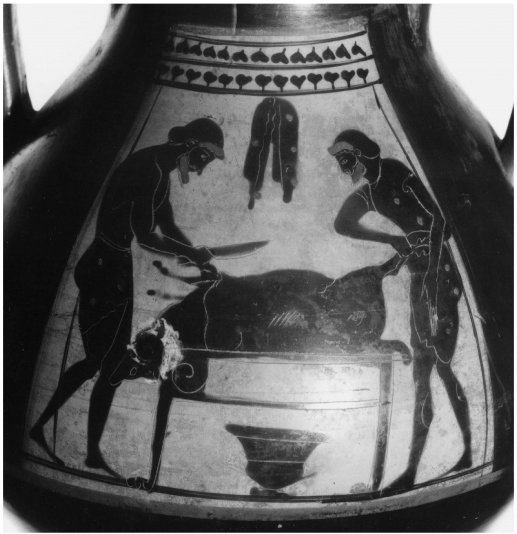

But, Homer is difficult to reconcile with archaeology. Should we compare his poems w/ the archaeology from when he was writing (750ish BC) or w/ the supposed time of the Trojan War (around 1200ish BC)
Descriptions of spears match those used in both the Bronze and Iron Ages
/3

Descriptions of spears match those used in both the Bronze and Iron Ages
/3


These anachronisms (“things out of time” #wotd) are partly b/c Homer (if s/he was one person) wasn’t the only author. It was oral poetry that changed with each performance
Like the earliest recorded blues musicians, Homeric poetry owes to a long-lived folk tradition
/4
Like the earliest recorded blues musicians, Homeric poetry owes to a long-lived folk tradition
/4
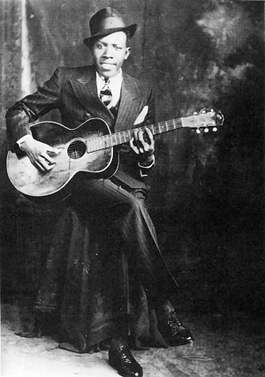
So, how can we relate fictional Homer to ancient reality?
Consider a pseudo-portrait of Homer sculpted hundreds of years after he died. It doesn’t show us how Homer actually looked. But it does help us understand how people later came to see this character
/5
Consider a pseudo-portrait of Homer sculpted hundreds of years after he died. It doesn’t show us how Homer actually looked. But it does help us understand how people later came to see this character
/5

This way of looking at a work of art or text is called reception studies. The emphasis is placed on the audience, and how they might have perceived Homeric epic
We can use the archaeology of the ancient Greek diet to understand how Homeric feasts were viewed
/6
We can use the archaeology of the ancient Greek diet to understand how Homeric feasts were viewed
/6
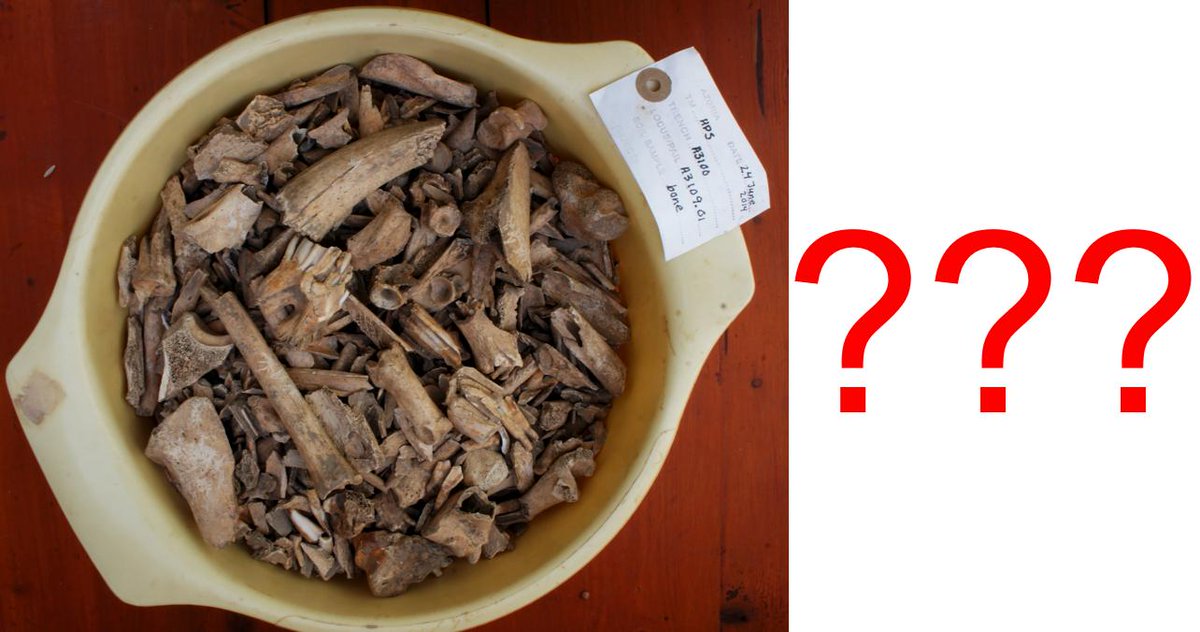
The ratios of different isotopes from human skeletons give a sense of ancient diet. Specifically, the ratio of Nitrogen isotopes provides evidence of how carnivorous an individual was. A plant would be the lowest followed by an herbivore followed by a carnivore
/7
/7

Carnivores who eat other carnivores are the highest (large fish eat small fish who eat smaller fish)
So, Nitrogen isotopes show how much meat (& dairy), fish, and veggies were consumed by ancient people. The conclusions can be refined with other tests too (e.g., Carbon)
/8
So, Nitrogen isotopes show how much meat (& dairy), fish, and veggies were consumed by ancient people. The conclusions can be refined with other tests too (e.g., Carbon)
/8

Why does this matter?
Well, different people ate very different quantities of meat, and Homeric poetry features a lot of animal sacrifice and meat
/9

Well, different people ate very different quantities of meat, and Homeric poetry features a lot of animal sacrifice and meat
/9
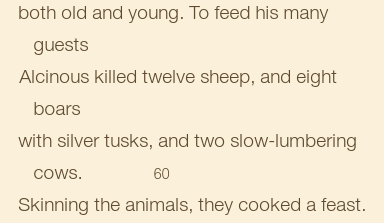
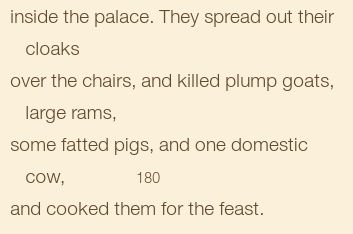
For a long time, people thought that Homeric feasts reflected a meat-heavy diet in the Early Iron Age of Greece
After the fall of the Bronze Age palaces, people turned away from agriculture and towards animal herding. From farmers to cowboys
/10
After the fall of the Bronze Age palaces, people turned away from agriculture and towards animal herding. From farmers to cowboys
/10

My research at Nichoria has helped disprove this idea, specifically that of Dark Age Greek cowboys: uc.edu/news/articles/…
But, it’s not just animal bones, nitrogen isotope ratios show that people ate less meat in the Early Iron Age than those living in Bronze Age palaces
/11
But, it’s not just animal bones, nitrogen isotope ratios show that people ate less meat in the Early Iron Age than those living in Bronze Age palaces
/11

So, in a sense you have songs salivating over “every kind of meat” performed for an audience of meat-starved Early Iron Age Greeks.
Emily Wilson’s translation of “rich roast meat” definitely gives a delicious food porn vibe
/12
Emily Wilson’s translation of “rich roast meat” definitely gives a delicious food porn vibe
/12

But what about for later Greeks, say those who knew Plato in Classical Athens of the 5th century?
Nitrogen isotope ratios from a few cemeteries in Athens show that these Classical Athenians ate a lot more animal products than the Early Iron Age Greeks
/13
Nitrogen isotope ratios from a few cemeteries in Athens show that these Classical Athenians ate a lot more animal products than the Early Iron Age Greeks
/13

The animal bones from Classical Athens were butchered differently from those from sites I’ve seen in Early Iron Age Greece. They’ve mostly been chopped through with cleavers, rather than sliced with knives. I think of it as meat-processing on a larger-scale
/14

/14


Some of this meat eating surely relates to the more common sacrificial feasts of the period, where they did the same rituals as in Homer. Burned thighbones are found aplenty near sacrificial altars
Homeric scenes were no longer food porn, but descriptions of regular feasts
/15

Homeric scenes were no longer food porn, but descriptions of regular feasts
/15


Instead, the Classical Athenians were focused on processed foods. As @ScullinSarah argues, these were seen as “civilizing” and healthy: eidolon.pub/hippocrates-wo…
Heavily butchered animal remains show this too. These pork cheeks and shoulders were probably cured
/16
Heavily butchered animal remains show this too. These pork cheeks and shoulders were probably cured
/16

The introduction of new cookpot types in Classical Athens also shows that new types of cooking were being introduced.
Comic poets, in their own version of food porn, highlighted this new cuisine and emphasized fish as an important delicacy
/17

Comic poets, in their own version of food porn, highlighted this new cuisine and emphasized fish as an important delicacy
/17


These culinary shifts surely affected how Homeric feasting was seen.
Homer’s out-of-date food porn was even commented on by Euboulos: “Where does Homer ever speak of any of the Achaians eating fish?
/18
Homer’s out-of-date food porn was even commented on by Euboulos: “Where does Homer ever speak of any of the Achaians eating fish?
/18

So, yeah. Ancient food porn is kinda cool to think about. Does the nudity in this painting make it a cross between real porn and food porn?
/19
/19
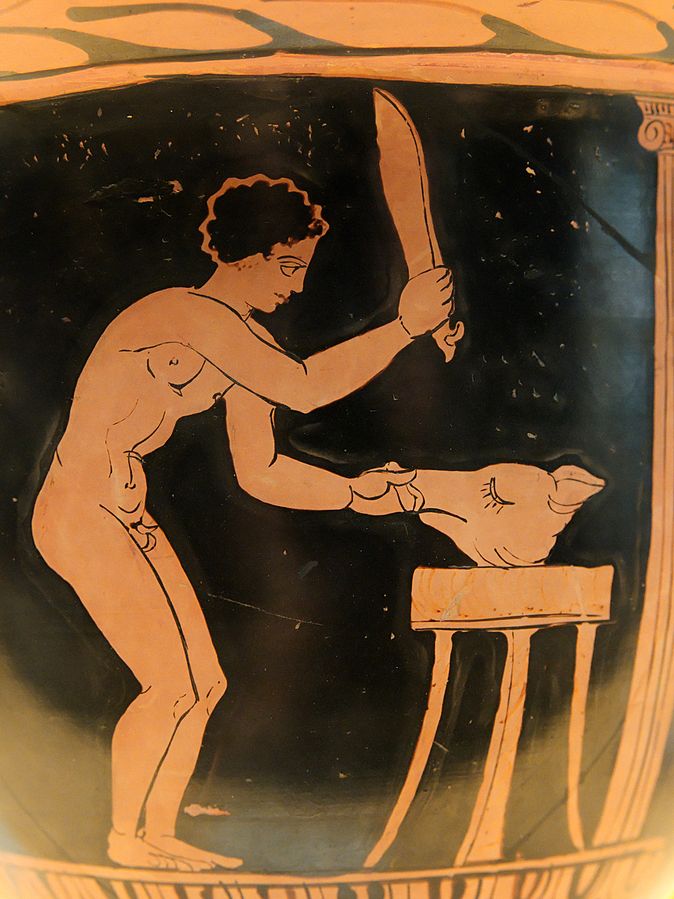
For citations to images and quotations in this thread, see below:
https://twitter.com/FDibbleCitation/status/1098225686333009920
If you liked this thread, keep your eyes peeled.
I’ve got an awesome article coming out tomorrow for @eidolon_journal’s #FoodSpecial. I argue that studying ancient food is important in today’s world.
I’ve got an awesome article coming out tomorrow for @eidolon_journal’s #FoodSpecial. I argue that studying ancient food is important in today’s world.
And if you’re interested in more about my research on ancient sacrificial feasting, check out the thread below:
https://twitter.com/FlintDibble/status/1032289489039835136
• • •
Missing some Tweet in this thread? You can try to
force a refresh










